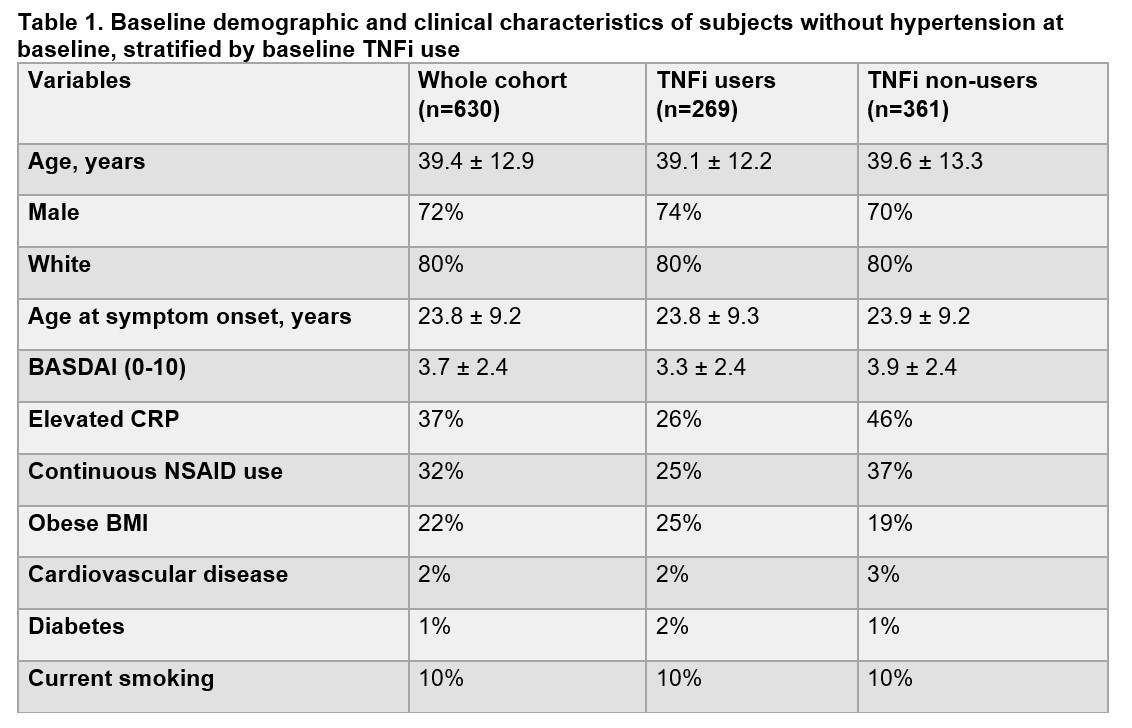Session Information
Date: Sunday, November 7, 2021
Title: Spondyloarthritis Including PsA – Treatment Poster I: Axial Spondyloarthritis (0908–0939)
Session Type: Poster Session B
Session Time: 8:30AM-10:30AM
Background/Purpose: Ankylosing spondylitis (AS) is associated with greater cardiovascular (CV) risk than in the general population. The impact of tumor necrosis factor inhibitors (TNFi) on CV risk in AS, including on the development of hypertension, an important CV risk factor, remains unclear. We aimed to determine the association of TNFi use with incident hypertension in a longitudinal AS cohort.
Methods: Adults with AS were enrolled in a prospective cohort during 2002-2018 and examined every 4-6 months. TNFi use during the preceding six months was ascertained at each study visit. We defined hypertension by patient-reported hypertension, anti-hypertensive medication use, or, on two consecutive visits, systolic blood pressure ≥140 mm Hg or diastolic ≥90 mm Hg. We evaluated the association between TNFi use and the development of hypertension with marginal structural models, estimated by inverse probability weighting, to account for time-dependent confounders (nonsteroidal anti-inflammatory drug use and disease activity) and informative censoring.
Results: We included 630 participants without baseline hypertension, and at least one year of follow-up. Of these, 72% were male, with a mean age at baseline of 39±13 years, and 43% used TNFi at baseline. On follow-up (median 5 years), 129 developed incident hypertension. TNFi use was not associated with incident hypertension (adjusted hazard ratio 1.11, 95% CI 0.86-1.44).
Conclusion: In this prospective AS cohort, there was no conclusive evidence to support an increased risk of incident hypertension with TNFi use, after accounting for important baseline and time-dependent confounding factors.
To cite this abstract in AMA style:
Liew J, Jafarzadeh S, Dubreuil M, Heckbert S, Mooney S, Brown M, Ishimori M, Reveille J, Ward M, Weisman M, Gensler L. The Association of TNF Inhibitor Use with Incident Hypertension in Ankylosing Spondylitis: Data from the PSOAS Cohort [abstract]. Arthritis Rheumatol. 2021; 73 (suppl 9). https://acrabstracts.org/abstract/the-association-of-tnf-inhibitor-use-with-incident-hypertension-in-ankylosing-spondylitis-data-from-the-psoas-cohort/. Accessed .« Back to ACR Convergence 2021
ACR Meeting Abstracts - https://acrabstracts.org/abstract/the-association-of-tnf-inhibitor-use-with-incident-hypertension-in-ankylosing-spondylitis-data-from-the-psoas-cohort/

